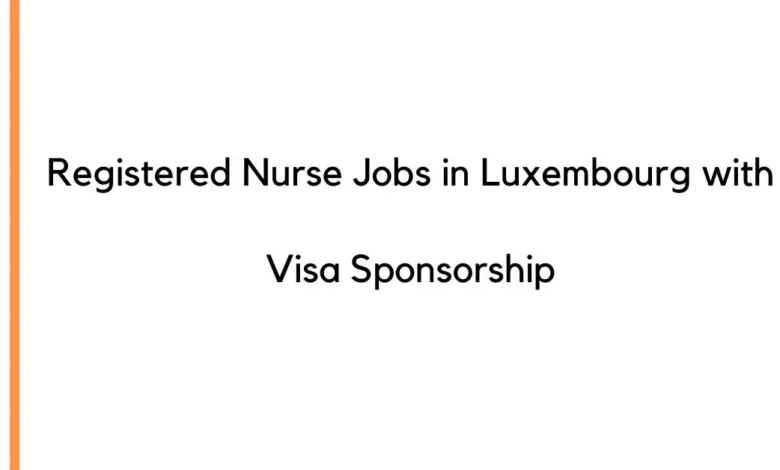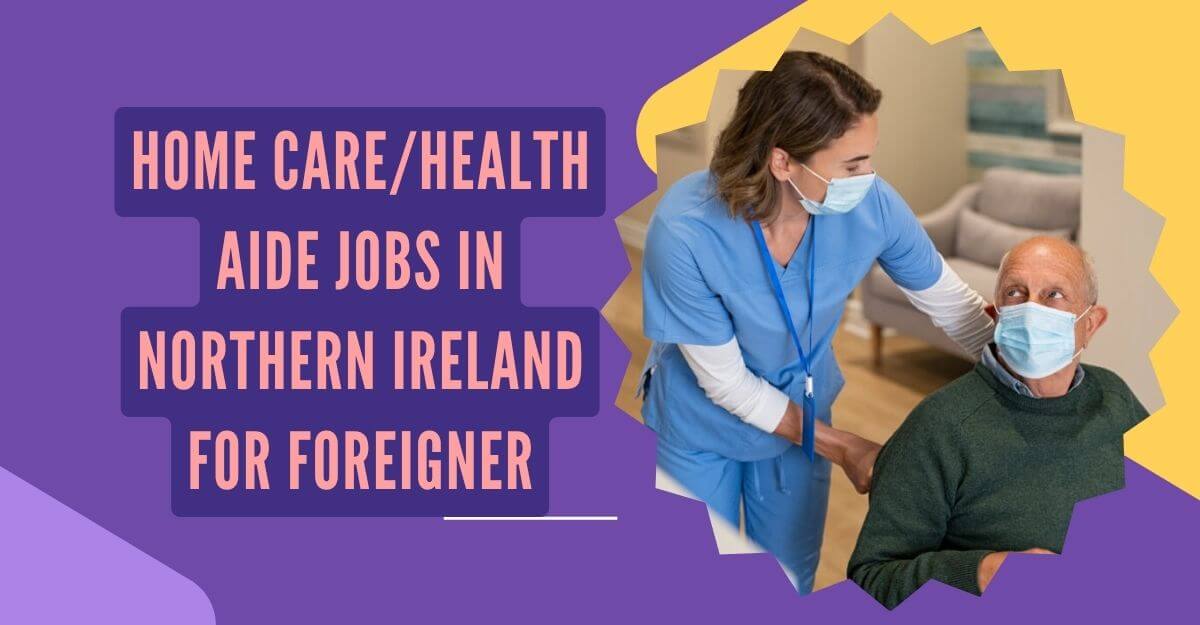Registered Nurse Jobs in Luxembourg with Visa Sponsorship

From the nursing possibilities world in Luxembourg, greetings! You have the opportunity to start a rewarding career as a licensed nurse in one of the most dynamic and diverse nations in Europe. Talented medical professionals from around the globe can contribute their abilities to the Luxembourgish healthcare system with the sponsorship of a visa. Come along with us as we provide compassionate care in a lively and secure setting.
Job Details
- Job Country: Luxembourg
- Industry: Healthcare
- Job Type: Registered Nurse
- Experience Required: Relevant nursing experience
- Education Required: Nursing Degree and Required Certifications
- Age Limit: No specified age limit
- Visa Sponsorship: Available
Read Also: Healthcare Jobs in Luxembourg With Visa Sponsorship
Qualifications and Requirements
In order to become a registered nurse in Luxembourg, applicants need to fulfil the following criteria:
1. Nursing Qualifications
- possess a current nursing degree or certification.
- Have the necessary licences and qualifications to practise.
2. Language Proficiency
- In healthcare settings, speaking French, German, or Luxembourgish is frequently necessary.
3. Work Experience
- Depending on the role and degree of responsibility, certain jobs could have a minimum need of years of nursing experience.
4. Visa Sponsorship Eligibility
- Make sure you fulfil the conditions for visa sponsorship, which may involve particular standards established by the government of Luxembourg.
5. Medical Registration
- To legally practise nursing in Luxembourg, you must register with the Ministry of Health or another appropriate regulating agency.
6. Cultural Adaptability
- Exhibit knowledge of and a readiness to adjust to the cultural norms and healthcare system in the area.
7. Skills and Competencies
- Excellent cooperation, critical thinking, communication, and the capacity to operate in a multicultural and varied workplace.
Benefits
1. Competitive Compensation
Depending on their location, specialisation, and experience, registered nurses (RNs) earn competitive pay. Numerous healthcare facilities provide bonuses, shift differentials, overtime compensation, and attractive compensation packages.
2. Comprehensive Healthcare Benefits
Comprehensive healthcare benefits, like as health, dental, and vision insurance, are included in the majority of nursing positions. These advantages, which provide access to high-quality healthcare and financial stability, frequently extend to the nurse’s family.
3. Job Stability & High Demand
Globally, there is a steady need for qualified nurses because of the requirement to provide high-quality patient care, the management of chronic diseases, and ageing populations. Long-term career stability is guaranteed by this employment security.
4. High-Quality Healthcare System
Nurses may deliver excellent patient care, adhere to best medical practices, and work in a controlled, structured setting that puts patient safety first when they are employed by a reputable healthcare system.
5. Networking Opportunities
Physicians, specialists, and other medical professionals collaborate closely with nurses. Through networking, they can stay up to date on medical developments, have access to career growth possibilities, and learn from more seasoned colleagues.
6. Collaboration with Dedicated Healthcare Teams
Nurses work alongside doctors, therapists, and technologists in interdisciplinary teams. Cooperation strengthens professional development, promotes cooperation, and improves patient care outcomes.
7. Exposure to Advanced Medical Technologies
Modern hospitals and healthcare facilities make use of state-of-the-art medical technology, which enables nurses to improve their skills and competence by getting hands-on experience with the newest tools and treatment techniques.
8. Working with Diverse Patient Populations
Patients from a variety of social, cultural, and ethnic backgrounds interact with nurses. Cultural competency, empathy, and the capacity to deliver individualised patient care are all improved by this encounter.
9. Leadership Opportunities
Nurses can assume leadership positions as educators, administrators, or nurse managers with further training and experience. More influence on healthcare policies and patient care is possible in leadership positions.
10. Flexible Work Schedules & Shifts
Day, night, and weekend shifts are among the work schedule options available to nurses. In order to promote work-life balance, several positions can provide travel or part-time nursing options.
11. Supportive Work Environment for Career Growth
By offering professional development resources, continuing education courses, and mentorship, hospitals and other healthcare facilities enable nurses to progress in their professions by obtaining specialised training and certifications.
Responsibilities
Patient Care
Direct and empathetic patient care is the responsibility of registered nurses. This comprises:
- Conducting patient assessments
- Administering medications and treatments
- Monitoring vital signs
- Assisting with procedures and recovery
2. Maintaining Records
Nurses must ensure accurate and up-to-date documentation of:
- Health records of patients
- Medical history and treatment plans
- Details of medication administration
- Doctors’ and healthcare teams’ progress notes
3. Collaboration
RNs work closely with other healthcare professionals, including:
- To create treatment plans, physicians, surgeons, and specialists
- Technicians and nursing assistants to support patient care
- Social workers and therapists to provide comprehensive patient care
4. Educating Patients
Patient education is crucial for recovery and disease prevention. Nurses help by:
- Outlining treatment plans and diagnostics
- Teaching about the adverse effects and appropriate use of medications
- Giving advice on preventive care and lifestyle modifications
5. Adherence to Protocols
Following established healthcare protocols ensures high-quality patient care. This includes:
- Complying with hospital and government regulations
- Maintaining hygiene and infection control standards
- Upholding ethical medical practices
6. Emergency Response
Nurses must be prepared to handle medical emergencies such as:
- Heart attacks, strokes, or respiratory distress
- Trauma cases in emergency rooms
- Administering CPR and life-saving interventions
7. Professional Development
To stay competent, RNs should:
- Stay informed about new treatments and medical advancements.
- Participate in training sessions, workshops, and ongoing education classes.
- Become certified in specialised fields, such as paediatrics or intensive care units.
8. Advocacy for Patients
Nurses act as patient advocates by:
- Making certain that patients’ rights and dignity are upheld
- Sharing patient concerns with hospital administration and physicians
- Enhancing healthcare regulations to improve patient outcomes
How to Apply
Conclusion
With reasonable pay, excellent career progression prospects, and visa sponsorship for foreign workers, Luxembourg provides a vibrant and encouraging work environment for registered nurses. Nurses can contribute significantly to patient care while working in a cutting-edge medical environment by joining the Luxembourgish healthcare system. Apply right now to advance your career if you satisfy the requirements!
Frequently Asked Questions
-
Do I need to speak a specific language to work as a nurse in Luxembourg?
Yes, proficiency in French, German, or Luxembourgish is often required in healthcare settings.
-
What are the benefits of working as a nurse in Luxembourg?
Benefits include flexible work hours, leadership possibilities, career stability, competitive pay, healthcare coverage, and exposure to cutting-edge medical innovations.



